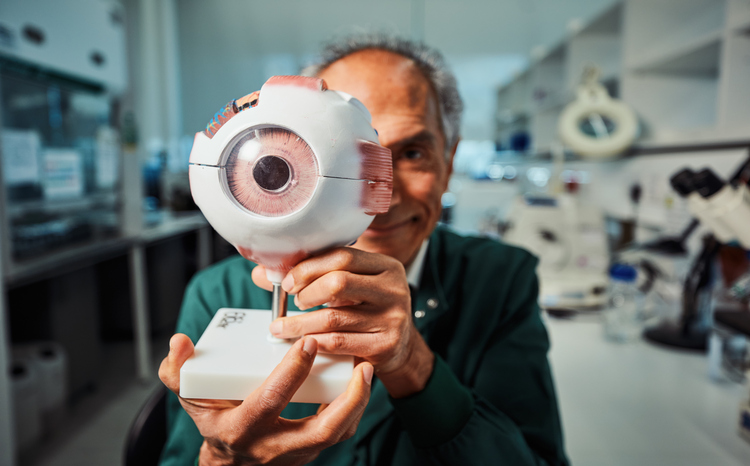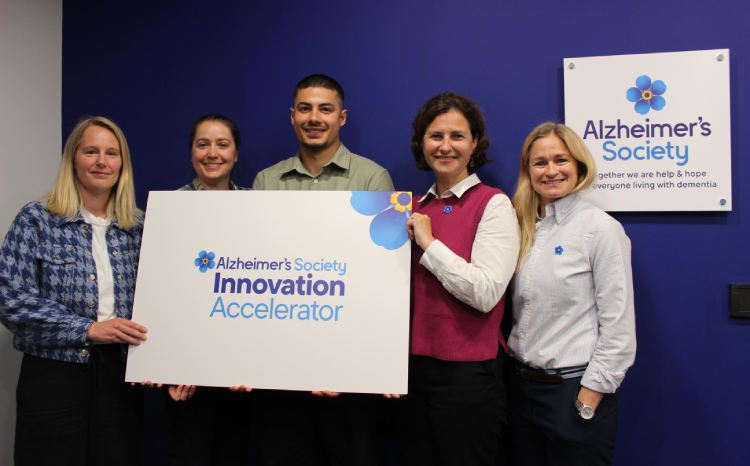High street opticians could spot dementia risk using AI tool
- 22 January 2025

- Researchers are working with high street opticians to develop an AI tool that can predict a person’s risk of dementia from an eye test
- The NeurEYE research team, led by the University of Edinburgh, with Glasgow Caledonian University, has collected almost a million eye scans from opticians across Scotland
- This anonymised data allows researchers to find patterns that could indicate a person’s risk of developing dementia and give a broad picture of brain health
Researchers are working with high street opticians to develop a digital tool that can predict a person’s risk of dementia from a routine eye test.
The NeurEYE research team, led by the University of Edinburgh, with Glasgow Caledonian University, has collected almost a million eye scans from opticians across Scotland, forming the world’s largest data set of its kind.
Scientists will use AI and machine learning to analyse the image data, linked to relevant patient data on demographics, treatment history and pre-existing conditions.
This anonymised data allows researchers to find patterns that could indicate a person’s risk of developing dementia and give a broad picture of brain health.
Baljean Dhillon, professor of clinical ophthalmology at the University of Edinburgh and NeurEYE co-lead, said: “The eye can tell us far more than we thought possible.
“The blood vessels and neural pathways of retina and brain are intimately related.
“But, unlike the brain, we can see the retina with the simple, inexpensive equipment found in every high street in the UK and beyond.”
Permission to use the data comes from the Public Benefit and Privacy Panel for Health and Social Care, a part of NHS Scotland.
The project is the second funded and supported by NEURii, a global collaboration between pharmaceutical company Eisai, Gates Ventures, the University of Edinburgh, medical research charity LifeArc and Health Data Research UK.
The first NEURii project, SCAN-DAN, is using brain scans and AI to predict dementia risk.
Opticians (also known as optometrists) will be able to use the software developed as a predictive or diagnostic tool for conditions such as Alzheimer’s, as a triage tool to refer patients to secondary health services if signs of brain disease are spotted, and potentially to monitor cognitive decline.
Ian Cameron, an optometrist based in Edinburgh, said: “We see the same people year on year, whether they’re ill or not, we have all the right equipment, so it makes sense for us to be the GP of the eyes and monitor as much health as we can see.
“What is new is that, with AI, we can see even more, and that is extremely powerful.”
Identifying people at risk of dementia could also accelerate the development of new treatments by identifying those who are more likely to benefit from trials and enabling better monitoring of treatment responses.
Miguel Bernabeu, professor of computational medicine at the Usher Institute and NeurEYE co-lead said: “Recent advances in AI promise to revolutionise medical image interpretation and disease prediction.
“However, in order to develop algorithms that are equitable and unbiased, we need to train them on datasets that are representative of the whole population at risk.
“This dataset, along with decades-long research at University of Edinburgh into ethical AI, can bring a step change in early detection of dementia for all.”
The data will be held in the Scottish National Safe Haven, which provides a secure platform for the research use of NHS electronic data.




